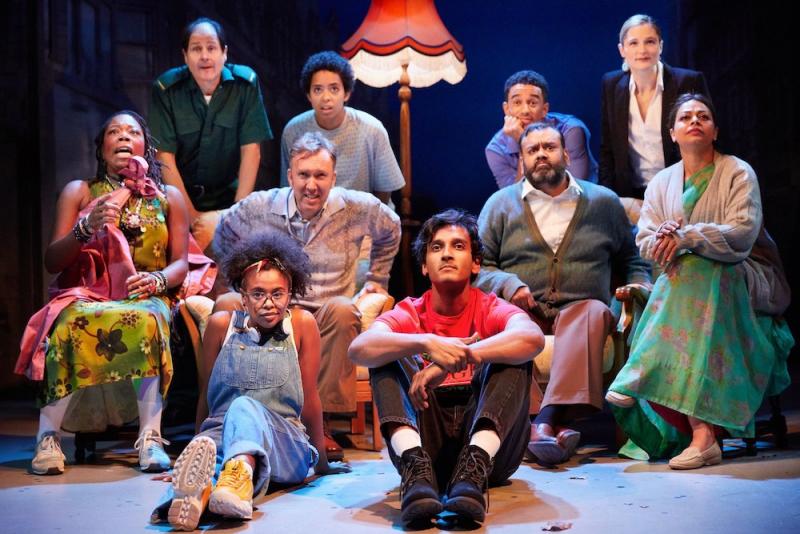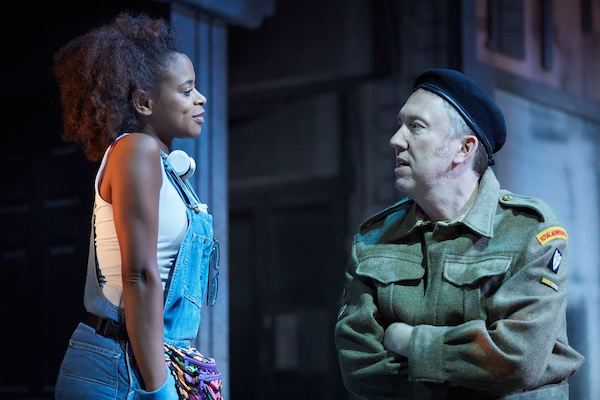White Teeth, Kiln Theatre review - tuneless hymn to Kilburn High Road | reviews, news & interviews
White Teeth, Kiln Theatre review - tuneless hymn to Kilburn High Road
White Teeth, Kiln Theatre review - tuneless hymn to Kilburn High Road
Imaginative adaptation of Zadie Smith's 2000 classic let down by unnecessary music

You can see why artistic director Indhu Rubasingham chose to stage this version of Zadie Smith's classic White Teeth as part of the Kiln's opening season.
In a radical rewrite of the original, the play starts with Rosie, a young dentist who is attacked – for reasons that are unclear – by Mad Mary, a Jamaican woman who inhabits Kilburn High Road and is blitzed out by apocalyptic millennarian fantasies. As Rosie lies in a coma in hospital, she is visited by her mother Irie who, encouraged by the doctors, talks to her, telling her the stories of the two families that are at the center of Smith's book, and provides the answer to the question of who her real father is. As in the book, this is a story about the lifelong friendship of Archie Jones, a white working-class man, and Samad Iqbal, a Bengali Muslim, who first met during the second world war.
The role of Islamism makes the story hot
Here is where it gets complicated (a word often used in this story): Irie is the daughter of Archie and his much younger Jamaican wife Clara, while Samad, who works as a waiter in a curry house, is married to Alsana, and the couple have two identical twin sons, Magid and Millat. Samad is tormented by how difficult it is to be good Muslim in the West so he sends Magid to Bengal so that he can be brought up as a practising Muslim. Smith's irony of course is that Majid is increasingly Westernised, becoming a secular scientist, while Millat, after spending his early teens enjoying sex and drugs and rap music, joins the hilariously named KEVIN (Keepers of the Eternal and Victorious Islamic Nation), a fundamentalist group.
Because of their fathers' friendship, Millat and Irie have known each other since infancy and when they are caught smoking dope at school they are sent for extra tuition to the home of Marcus and Joyce Chalfen, a middle-class family with highly academic aspirations for their son Joshua. Marcus is a scientist working on the comically named "Future Mouse", a project aiming to cure cancer through genetic intervention. Because of his work he comes into contact with Magid and, when the latter returns to London, he quarrels with his Islamist brother Millat. Is Western science a human good or are its practitioners usurpers of God's creation – and therefore blasphemous?
Sharkey's version follows the novel in having several rewinds, and then fast forwards, which are often a bit confusing, and this is one of those plays which really need some prior knowledge of the original to make any sense at all. Clarity is not helped by the decision to stage the story as a play with music, with several song and dance routines, none of which are particularly thrilling or memorable, although a couple have a comic touch, usually involving Mad Mary. The play milks the local references for all they are worth, and succeeds more or less in celebrating the "multi-culti London muddle" which is part of the novel's appeal. But its music and energy is not a patch on the Young Vic's Twelfth Night.
 In fact, Sharkey's version does respect the broad harmonies of Smith's original, with its scenes that resonate with each other, and its strong metaphorical content: teeth that remain white whatever an individual's skin colour; the role of randomness (flipping a coin) versus design; gun shots that miss. In some moments you can hear Smith's distinctive voice, although her fans will miss Samad's epic masturbations, Joyce's cringing middle-class blunders, and Joshua, who gets barely a line. Also sadly missing is the wonderful tale of Samad's putative ancestor Mangal Pandey, a Hindu soldier famous for firing the first shot of the Indian Mutiny of 1857 (he missed). But, in compensation, Irie's passionate attraction to Millat gets centre stage, and the role of Islamism makes the story hot.
In fact, Sharkey's version does respect the broad harmonies of Smith's original, with its scenes that resonate with each other, and its strong metaphorical content: teeth that remain white whatever an individual's skin colour; the role of randomness (flipping a coin) versus design; gun shots that miss. In some moments you can hear Smith's distinctive voice, although her fans will miss Samad's epic masturbations, Joyce's cringing middle-class blunders, and Joshua, who gets barely a line. Also sadly missing is the wonderful tale of Samad's putative ancestor Mangal Pandey, a Hindu soldier famous for firing the first shot of the Indian Mutiny of 1857 (he missed). But, in compensation, Irie's passionate attraction to Millat gets centre stage, and the role of Islamism makes the story hot.
Rubasingham directs effectively, on designer Tom Piper's simple set, although the song and dance sequences strike me as messy and often half-hearted. Ayesha Antoine is a mild-mannered and sincere Irie (pictured above with Richard Lumsden), while Amanda Wilkin has an attractive calm openness as Rosie. Lumsden and Tony Jayawardena play Archie and Samad almost as a cautious double act, while Assad Zaman is satisfyingly expressive as Millat. Best of all is the scene-stealing Michele Austin as the larger-than-life Mad Mary, who is full of fun and at one point amusingly transforms with a sudden change of accent into a middle-class teacher. They all contribute to an evening which balances uneasily between fun and muddle.
The future of Arts Journalism
You can stop theartsdesk.com closing!
We urgently need financing to survive. Our fundraising drive has thus far raised £49,000 but we need to reach £100,000 or we will be forced to close. Please contribute here: https://gofund.me/c3f6033d
And if you can forward this information to anyone who might assist, we’d be grateful.

Subscribe to theartsdesk.com
Thank you for continuing to read our work on theartsdesk.com. For unlimited access to every article in its entirety, including our archive of more than 15,000 pieces, we're asking for £5 per month or £40 per year. We feel it's a very good deal, and hope you do too.
To take a subscription now simply click here.
And if you're looking for that extra gift for a friend or family member, why not treat them to a theartsdesk.com gift subscription?
more Theatre
 Troilus and Cressida, Globe Theatre review - a 'problem play' with added problems
Raucous and carnivalesque, but also ugly and incomprehensible
Troilus and Cressida, Globe Theatre review - a 'problem play' with added problems
Raucous and carnivalesque, but also ugly and incomprehensible
 Clarkston, Trafalgar Theatre review - two lads on a road to nowhere
Netflix star, Joe Locke, is the selling point of a production that needs one
Clarkston, Trafalgar Theatre review - two lads on a road to nowhere
Netflix star, Joe Locke, is the selling point of a production that needs one
 Ghost Stories, Peacock Theatre review - spirited staging but short on scares
Impressive spectacle saves an ageing show in an unsuitable venue
Ghost Stories, Peacock Theatre review - spirited staging but short on scares
Impressive spectacle saves an ageing show in an unsuitable venue
 Hamlet, National Theatre review - turning tragedy to comedy is no joke
Hiran Abeyeskera’s childlike prince falls flat in a mixed production
Hamlet, National Theatre review - turning tragedy to comedy is no joke
Hiran Abeyeskera’s childlike prince falls flat in a mixed production
 Rohtko, Barbican review - postmodern meditation on fake and authentic art is less than the sum of its parts
Łukasz Twarkowski's production dazzles without illuminating
Rohtko, Barbican review - postmodern meditation on fake and authentic art is less than the sum of its parts
Łukasz Twarkowski's production dazzles without illuminating
 Lee, Park Theatre review - Lee Krasner looks back on her life as an artist
Informative and interesting, the play's format limits its potential
Lee, Park Theatre review - Lee Krasner looks back on her life as an artist
Informative and interesting, the play's format limits its potential
 Measure for Measure, RSC, Stratford review - 'problem play' has no problem with relevance
Shakespeare, in this adaptation, is at his most perceptive
Measure for Measure, RSC, Stratford review - 'problem play' has no problem with relevance
Shakespeare, in this adaptation, is at his most perceptive
 The Importance of Being Earnest, Noël Coward Theatre review - dazzling and delightful queer fest
West End transfer of National Theatre hit stars Stephen Fry and Olly Alexander
The Importance of Being Earnest, Noël Coward Theatre review - dazzling and delightful queer fest
West End transfer of National Theatre hit stars Stephen Fry and Olly Alexander
 Get Down Tonight, Charing Cross Theatre review - glitz and hits from the 70s
If you love the songs of KC and the Sunshine Band, Please Do Go!
Get Down Tonight, Charing Cross Theatre review - glitz and hits from the 70s
If you love the songs of KC and the Sunshine Band, Please Do Go!
 Punch, Apollo Theatre review - powerful play about the strength of redemption
James Graham's play transfixes the audience at every stage
Punch, Apollo Theatre review - powerful play about the strength of redemption
James Graham's play transfixes the audience at every stage
 The Billionaire Inside Your Head, Hampstead Theatre review - a map of a man with OCD
Will Lord's promising debut burdens a fine cast with too much dialogue
The Billionaire Inside Your Head, Hampstead Theatre review - a map of a man with OCD
Will Lord's promising debut burdens a fine cast with too much dialogue
